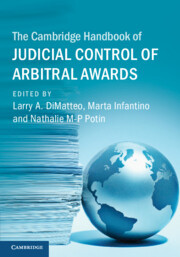Description
The Cambridge Handbook of Judicial Control of Arbitral Awards
Cambridge Law Handbooks Series
Coordinators: DiMatteo Larry A., Infantino Marta, Potin Nathalie M-P
This unique collaboration between academics and practitioners explores the intersection of international commercial arbitration and the court systems.
Language: English
Subject for The Cambridge Handbook of Judicial Control of Arbitral...:
The Cambridge Handbook of Judicial Control of Arbitral Awards
Publication date: 03-2023
Support: Print on demand
Publication date: 03-2023
Support: Print on demand
The Cambridge Handbook of Judicial Control of Arbitral Awards
Publication date: 10-2020
484 p. · 18.1x25.9 cm · Hardback
Publication date: 10-2020
484 p. · 18.1x25.9 cm · Hardback
Description
/li>Contents
/li>Biography
/li>
A unique collaboration between academic scholars, legal practitioners, and arbitrators, this handbook focuses on the intersection of arbitration - as an alternative to litigation - and the court systems to which arbitration is ultimately beholden. The first three parts analyze issues relating to the interpretation of the scope of arbitration agreements, arbitrator bias and conflicts of interest, arbitrator misconduct during the proceedings, enforceability of arbitral awards, and the grounds for vacating awards. The next section features fifteen country-specific reviews, which demonstrate that, despite the commonality of principles at the international level, there is a significant of amount of differences in the application of those principles at the national level. This work should be read by anyone interested in the general rules and principles of the enforceability of foreign arbitral awards and the grounds for courts to vacate or annul such awards.
Part I. Vacating Commercial Arbitration Awards: 1. Introduction: Intersection of courts and arbitration Marta Infantino, Nathalie Potin and Larry A. Dimatteo; 2. Independence and impartiality of arbitrators Carlos Matheus López; 3. Exploring the parameters of conflicts of interest Nathalie Potin and Tunde Ogunseitan; 4. Procedural irregularities and misconduct during proceedings Alexander Belohlavek; Part II. Enforcing Commercial Arbitration Awards: 5. Inter-arbitration association conflict Richard Happ; 6. Requirements for enforceability Daìrio Manuel Lentz De Moura Vicente; Part III. Scope and Interpretation of Arbitration Clauses: 7. Judicial interpretation of standard clauses Rocio Digon and Tony Cole; 8. Industry-specific clauses and their interpretation Alexandra-Luiza Ionescu (Mareș); 9. Drafting, interpretation, and enforcement of arbitration clauses: a practitioner's perspective Philippe Cavalieros; Part IV. Judicial Control over Arbitral Awards: Country Reports: 10. Judicial control of arbitral awards in Argentina Maria Beatriz Burghetto; 11. Judicial control of arbitral awards in Australia Luke Nottage, Nobumichi Teramura and Jim Morrison; 12. Judicial control of arbitral awards in Bulgaria Oleg Temnikov; 13. Judicial control of arbitral awards in China Lei Chen and Wang Hao; 14. Judicial control of arbitral awards in France Denis Bensaude; 15. Judicial control of arbitral awards in Germany Joseph Schwartz; 16. Judicial control of arbitral awards in Italy Marta Infantino; 17 Judicial control of arbitral awards in Nigeria Tunde Ogunseitan and Nathalie Potin; 18. Judicial control of arbitral awards in Poland Jerzy Pisuliński and Piotr Tereszkiewicz; 19. Judicial control of arbitral awards in the Russian Federation Dmitry Dozhdzev; 20. Judicial control of arbitral awards in Spain Teresa Rodriguez De Las Heras Ballell; 21. Judicial control of arbitral awards in Switzerland Phillip Landolt; 22. Judicial control of arbitral awards in Ukraine Galyna Mykhailiuk; 23. Judicial control of arbitral awards in United Kingdom Andrew Tetley; 24. Judicial control of arbitral awards in the United States Larry A. Dimatteo; Part V. Summary and Findings: 25. Divergence, themes, and trends in national arbitration laws Nathalie Potin, Marta Infantino and Larry A. Dimatteo; 26. Shared control system over arbitral proceedings Friedrich Rosenfeld.
Larry A. DiMatteo is Huber Hurst Professor of Contract Law, Warrington College of Business and Levin College of Law at the University of Florida. He is the former Editor-in-Chief of the American Business Law Journal, a 2012 Fulbright Professor, and author of thirteen books including The Cambridge Handbook of Smart Contracts, Blockchain Technology and Digital Platforms (with Michel Cannarsa and Cristina Poncibò, Cambridge, 2019).
Marta Infantino is Associate Professor of Comparative Law, IUSLIT Department, University of Trieste. She has held visiting professorships in Canada, Colombia, and France. She has authored or co-authored eight books and more than sixty articles in Italian, French, and English. Her work has been translated into Greek, Chinese, and Spanish.
Nathalie M-P Potin is Academic Director of LL.M./Masters in English at the Faculty of Law, Catholic Univeristy of Lyon. She has practiced in several international commercial law firms and worked at the Secretariat of the International Court of Arbitration of the International Chamber of Commerce. She holds visiting professorships in Europe, the Middle East, and the United States.
Marta Infantino is Associate Professor of Comparative Law, IUSLIT Department, University of Trieste. She has held visiting professorships in Canada, Colombia, and France. She has authored or co-authored eight books and more than sixty articles in Italian, French, and English. Her work has been translated into Greek, Chinese, and Spanish.
Nathalie M-P Potin is Academic Director of LL.M./Masters in English at the Faculty of Law, Catholic Univeristy of Lyon. She has practiced in several international commercial law firms and worked at the Secretariat of the International Court of Arbitration of the International Chamber of Commerce. She holds visiting professorships in Europe, the Middle East, and the United States.
© 2024 LAVOISIER S.A.S.

